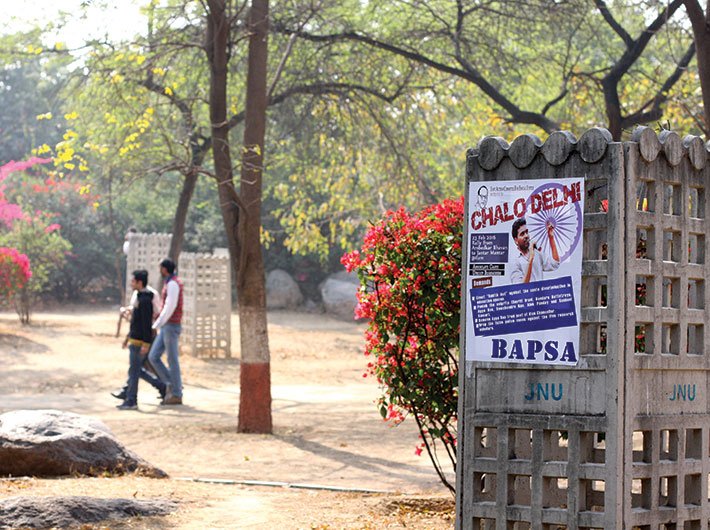I first entered JNU in July 1997, weeks before India celebrated its fiftieth year of azaadi. Like most freshers, I was overawed by JNU’s sylvan sprawl, its honeycomb of red-brick buildings, its scruffy, jargon-spouting, jhola-toting students. A thousand miles away from home and on my own for the first time, every cliché I had ever heard about freedom suddenly rang true.
The curriculum was à la carte; the classrooms laidback; the exams, often open-book affairs. There was endless chai pe charcha at canteens by day and dhabas by night; even hostels had curfews only in name. There were no mobile phones, and the internet access was still a distant dream; instead, there were pamphlets and protest marches, public lectures and post-dinner debates. Every square inch of wall, from the mess to the canteen to the library, was blitzkrieged by posters in black and white and red that urged you to “Study and Struggle!” No wonder JNU seemed less a university than a universe unto itself.
My most abiding memory that monsoon semester, though, would be of a man I never met, a face I never forgot. Comrade Chandrashekhar Prasad, a CPI(ML) activist and former president of the JNU Students Union (JNUSU), had been gunned down while addressing a street-corner meeting condemning the massacre of dalits in Siwan, Bihar on March 31, 1997. The Chandrashekhar Andolan, a massive student uprising that blazed from Lutyens Delhi to Lalu’s Bihar that summer in spite of a brutal police backlash, had dwindled down by the time we freshers arrived. And yet, each time the piercing gaze of this bearded, slightly built thirty-something greeted me from every second poster on campus, it made me recall Tamil poet Bharatiyar’s phrase “suttum vizhi chudar” (flame-bright eyes). Chandrashekhar was gone but his embers still glowed red-hot, as if to announce that the fight was far from over.
At the Centre for Linguistics and English, where I did my MA, there was a long list of courses on offer each semester from which you could pick and choose. I recall in particular a course on comparative literature where we were allowed to bring in texts of our choice. The texts were as eclectic as the students themselves, from all corners of India and South Asia, and the classes became the literary equivalent of a potluck, a feast of pluralism. Our teacher turned backbencher in his own classes so as to give us all enough elbow room, and watched us share readings and spar over translations from Iqbal and Faiz, Jibanananda Das and Ashapurna Debi, Manto and Ismat Chugtai, Ananthamurthy and Lalithambika Antharjanam. That course would be my most memorable life-lesson in difference and diversity. We boned up on Tagore’s internationalism and Benedict Anderson’s imagined community, and discovered that there were as many notions of nation as there were ways in which literature redrew and erased geo-political borders and boundaries.
In due course, beleaguered by too many books and ideas, I would turn a full-time truant. There were days when I wanted world enough and time to think, and there were days when I simply wanted to blot out all thought. And so when I wasn’t holed up in my hostel room, I went on long solitary walks in the craggy campus wilderness or hitched free rides to town on bus number 615. I could do both with impunity because back then, JNU was one of the safest places for women in Delhi. Far ahead of its time, it was also the first university in India to set up the Gender Sensitisation Committee against Sexual Harassment (GSCASH), a hard-won triumph of the JNUSU in the wake of the landmark judgment in the Vishaka case in 1997.
My two years were perhaps proof that JNU had space enough for students of all stripes, even the hopelessly apolitical, asocial, bourgeois ones – and to be sure, I gained much more from JNU than I have since been prepared to admit. As I watched the documentary on Chandrashekhar titled Ek Minute Ka Maun, I understood the passion of a young man’s commitment to social justice and the power of a student movement whose time had come. From classroom discussions to the all-night-long presidential debate ahead of student elections, I saw how dissent and dialogue could sit democratically cheek by jowl. I learnt that having “opinions” was all very well, but it was far more important to hold your peace (and tongue!) long enough to listen to other points of view at every turn. In a myriad ingenious ways, JNU made me alert and alive to the dangers of a single story much before Chimamanda Ngozi Adichie did.
Today, I know that JNU’s irrepressible spirit of azaadi, its legacies of resistance, and the sheer strength of its solidarity will surely sustain the university through these troubled times. As students and teachers close ranks and hold hands in one seamless chain, let Jawaharlal Nehru himself have the last word: “A university stands for humanism; for tolerance, for reason, for the adventure of ideas and for the search of truth. It stands for the onward march of the human race towards ever higher objectives. If the universities discharge their duties adequately, then it is well with the nation and the people.”
Sriram is a Chennai-based literary critic and translator.
(The article appears in March 1-15, 2016 issue)
